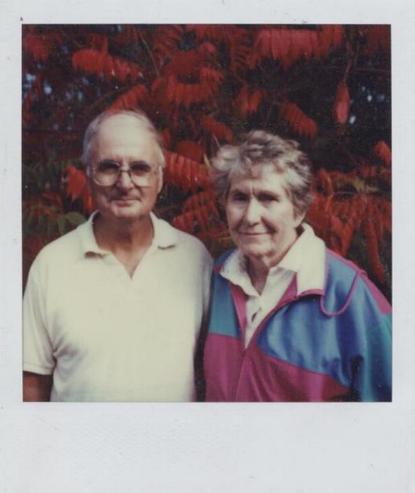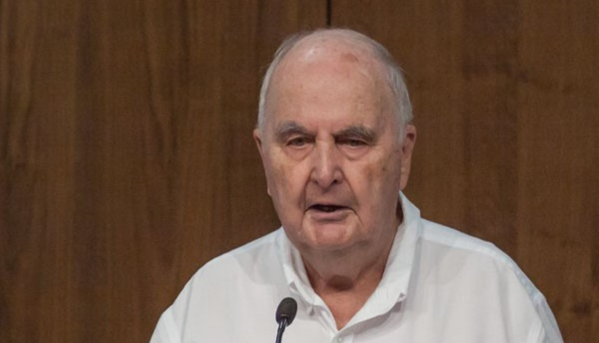 This is a monthly column helping us to get to know our friends and members in a deeper way. We thank Monte High for taking the time to do these in-depth interviews for our newsletter. Phil Ellsworth was born in Mishawaka, Indiana. Mishawaka adjoins South Bend, and straddles the southwestern Michigan border. The area hosts hundreds of lakes. “If there is a heaven, it’ll have lakes”. For summer vacation the family would pick a lake and put up a tent – where the family would live for the summer. Dad worked for the Studebaker Corporation; he would leave for work in the morning and join them again in the evening. They chose the banks of beautiful, clear-water lakes to stake down their flapping summer home. Phil and his younger sister Nancy were free to roam. They had a rowboat and long cane fishing poles. Days swimming through a world of water. They befriended kids from nearby farms. Phil and his dog Wiggs had many adventures. Phil also treasured the family road trips to the Upper Peninsula for scenic and wildlife viewing – hoping to spot a deer. Now the deer come to his backyard. During his senior year of high school, at the age of 17, Phil joined an Army reserve program for graduating boys. It was an officer training program designed mainly for engineers. He was at the University of Kentucky for a year when the Army discontinued the program and placed them all on active duty, as infantrymen. Phil went to Fort Benning, Georgia, for basic training, and then on to Fort Bragg, Kentucky where he joined the 100th Division. They landed in Marseilles, France, in October 1944. The Army shaped Phil’s entire life. He would carry the experience of war with him always. The following quotes and poems are from Phil’s book “Memories of War”: “November 9, 1944, my 19th birthday. We stand in the woods in the Vosges Mountains in Lorraine and sing several hymns before going into combat, among them “I Would Be True” and “I Need Thee Every Hour”. Before we can disperse, shells began exploding in the trees above us. Johnny Chillemi is our first fatality. After dark I am sent to the company command post on some errand. I poke a twig in my eye and make my way almost blindly.” “Christmas Eve, 1944. The open, rolling hills near Rimling, France are covered with snow. Burley and I huddle in a hole. A flare brings momentary daylight and then it’s night again. In the distance – but too close – the sound of German tanks on the move.” “It is mid-January, 1945. Robert Burlison (Burley) dies of wounds received when the company is overrun.” Robert Burlison American Cemetery, Epinal, France If he knew fear, I did not see. He was a brother’s arm to me, And when he fell, fell part of me. Epinal It seems unfair, considering all, That I am here in this place now With ninety summers on my brow And you are there in Epinal Among our comrades sleeping there, That I can hear the robins sing And see the almond tree in spring And you are there. It isn’t fair. Flowers, if you grow in Epinal, Grow near where Robert lies. I will dream that he has eyes And sees some fairness after all. The Meeting Once, in a contested place, I met a soldier face to face. We stopped and turned and walked away, Both to live another day. I often wonder who he was And where he is and whom he loves, And if he ever sees, like me, A soldier in his memory, Or if before the end he fell, Leaving only me to tell Of our meeting, face to face, Once, in a contested place. Talking to a high school class about the war When I talk to them about the war I tell them of the ones we left behind To be gold stars in grieving windowpanes, How if you live they’re what you think about And glory isn’t even in your mind. And what of those caught in your rifle sight? Those, too, you think about, for they as you Trudged in the mud, lay fearful in the night And dreamed of home. Those, too, you think about, ... Those, too... I tell them that; I know it to be true. “There are three to whom I know I owed my life during the war. Two were German, one of them an officer that must have said, “Hold your fire”.” “How improbable, to have survived and to be here in this place. It is as if I have lived two totally different lives. I wonder how many veterans feel the same.” On Phil’s first day home from the war, his dad took him to the local pub to get a drink – but they wouldn’t serve him because he was too young. Phil took advantage of the G.I. bill to get a geological engineering degree from Michigan Technological University. His first job out of school was for an iron mining company. He was lucky to be in the first group to ride the cage down a new 2000 ft. deep underground shaft – lucky that an old Welsh miner stopped Phil from leaning against the back of the cage when he didn’t realize there was no back to lean against. What he thought was the back was the rock wall going by too fast to be seen. In 1952 Phil was hired by the Atomic Energy Commission. He loaded up his 1935 Plymouth and headed West – to Grand Junction, Colorado. The AEC office was located along the Colorado River, a short distance southwest of the Fifth Street bridge. Grand Junction was home-base, but Phil and a college friend were stationed in the Lukachukai Mountains near Shiprock, New Mexico. They were searching for uranium. Every other weekend Riggs Aviation would fly them back to Grand Junction in a Beechcraft Bonanza airplane. Phil remembers the Hotel D and the Carousel Bar downtown. And a blind date romance that was cut short after two dates because of circumstances beyond his control. Margaret lived upstate in Craig, but was working on a nursing degree through St. Joe’s hospital in Denver. She happened to be in Grand Junction completing a training course for nurses who expected to work in rural hospitals. Phil was transferred to Grants, New Mexico; and Margaret disappeared from the face of the earth. After five months in Grants, Phil took a job with the Kerr-McGee Corporation, doing uranium exploration. His group was headquartered in Grand Junction. Phil started working on a project in the Powder River Basin in Wyoming. Every couple of weeks he would drive back to Grand Junction for a few days and then head back to Wyoming. One spring day he stopped for gas in Craig, when out of the blue he heard someone calling his name. It was Margaret! She was running an errand for her mother after finishing her shift at the hospital. She happened to look across the street and see a black 1948 Studebaker Commander convertible with red leather upholstery parked at the gas station, and knew she had been in that car. It took the time for her to cross the street for her to remember his name. Sure enough, there was Phil standing beside his car. Phil would revisit Craig every two weeks until they were married that September. Phil’s career took off and the family grew, by two girls and a boy. Phil and family had several stops across the West, Midwest, and Australia. Yes, Australia, where the entire family spent a year in Canberra, while Phil traversed the continent. The children enrolled in school and for a brief time became a part of the community, exotic birds and all. They all thoroughly enjoyed it, and they might have stayed longer but Margaret and Phil were worried that one of the girls would fall in love and get married – and forever be halfway across the world in Australia. Phil’s jobs sent him flying into some of the most remote and beautiful places in the world – all around North and South America, Greenland, Niger, Algeria, Fiji, Tahiti, New Zealand and Australia... including an unexpected stop in the remote jungle of Venezuela. On a flight from Caracas to the southeastern corner of the country Phil, his partner and the pilot found themselves over a complete cloud cover. After some time they realized from the sun position that they couldn’t be going in the planned direction, and were headed toward the Brazilian rain forest with a dysfunctional navigation system. As they became more and more nervous, the clouds inexplicably parted, and below them was a short grass landing field in the middle of the jungle. When the plane landed they were greeted by people who were mostly naked. Fortunately there was an English-speaking doctor in the village who could point them toward civilization. Phil is grateful for the adventures, the awesome natural beauty and the different cultures that he experienced; yet, what most motivated him in his work was the search for “Hidden Likenesses”. He was hooked by the feeling of the-moment-of-discovery, the feeling of seeing something for the first time that no one has seen before – in that moment your heart skips a beat. This search took place mostly at a desk, with geological information and maps. You take something you understand, and consider if it can somehow fit with something you don’t understand. There is a geological likeness between mineral deposits that tells you why they ended up where they are – “Hidden Likenesses” – if you can find it. Yet, in the moment of discovery it is as if “it” finds you, a gift from out of the blue. When Phil retired it was a natural transition, from searching for hidden likenesses that reveal minerals, to listening to the Muse that reveals a melody of word. Phil now spends most of his time writing – or listening, awaiting the moment of inspiration that appears out of nowhere, begging to be penned. Though the war is a shadow forever at Phil’s side, his life is defined by love. He was fortunate to find Margaret and the love that brought him a cherished family; and later in life to find another big, astonishing love, with Verity. Phil was fortunate to have loved two wonderful women. Sometimes at night he’ll look up at the stars and imagine that it’s Margaret and Verity looking at him. “Cedaredge is a good town to be old in”. Mornings you’re likely to find Phil at Stacy’s Main St. Gallery, drinking coffee and chatting with friends. His daughter Carolyn lives two blocks away and is a great help in his old age. (His daughter Ruth and son Philip live in Austin, Texas.) Friday afternoons you’ll find him at the nursing home playing his harmonica for the residents. Phil’s harmonica has provided him with some good company over the years. He spends a lot of time listening to music: music soothes him. Phil enjoys the monthly UU meetings of the Black Canyon of the Gunnison discussion group. And thanks to David and Kim Stueck, Phil is able to attend many Sunday services at the UUCGV. Most of you will have heard him speak, and were certainly touched by his adroit and heartfelt sermons (he calls them talks). You’ve heard his beautiful poetry. Phil has been a Unitarian since 1960 when he and Margaret joined the UU Fellowship in Golden, Colorado. My life flows on... in endless song... Comments are closed.
|
Archives
June 2023
Categories
All
|
|
|


 RSS Feed
RSS Feed